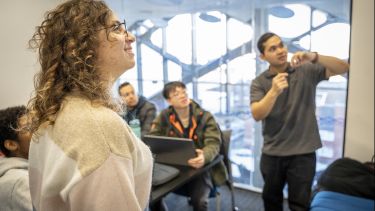Course structure

Semester dates
Our MSc courses run over 12 months, from September to September.
Current and future semester dates
Course and module information
You can find example module information for our courses in the prospectus.
Discover our MSc degree courses
First semester - Autumn
During the first semester you will be taught the fundamentals of your chosen degree. The knowledge and skills you develop in the first semester will help you in the rest of your masters degree. Practical sessions will allow you to develop your hands-on skills which will be important during your research project and also after you graduate.
You will start your project in the first semester. Before starting your first experiments you will do preliminary background reading and research which could include reading scientific papers in journals, health and safety training, and inductions to the laboratories and equipment you may be using.
Your first formal exams usually take place in January so you should start to prepare for them in the first semester. Your module leaders and personal tutor can give you advice on how to prepare for exams - this is especially useful if you haven't taken exams in the UK before. Most of your modules will provide content in the form of lectures, slides, recorded videos, example questions and answers, quizzes, past papers, reading lists and a variety of other content. All of this material is available to help you prepare for your examinations.
Second semester - Spring
During the second semester, you will be taught a series of modules which expand on what you learnt in the first semester by specialising in more advanced topics. Some of our degree courses allow you to choose from a list of available modules which customises your degree experience; other courses have a specific predetermined list of specialised modules.
At the end of the second semester, you will take a second series of examinations. Again, preparation will be key for success, however by this time you will be more experienced and have had some practice so should be able to perform to your best ability.
After the second semester examinations are complete, all that remains in your course is to complete your research project. By this stage you will have done your experiments and collected your data. The final stages of your dissertation are all about analysing your findings, developing your conclusion and communicating your ideas. Ultimately the aim is to answer the original question posed at the start of the project.
Dissertation project
During your masters degree, you will have the opportunity to do your own research project. This is an individual academic investigation in a research area of interest to you and is very much personalised to you. There are several stages to completing your dissertation of which the main points are listed below:
- Choose your project
- Conduct background reading and research, and perform an extensive literature review
- Collect data (through experiments and testing)
- Analyse your data
- Interpret your findings and produce a solution to your original question
- Write up your findings in your dissertation report
- Present your findings at a poster presentation
- Defend your dissertation during a viva voce

International Merit Scholarships
We offer a generous package of financial support for international students including 75 undergraduate scholarships worth £10,000 towards the annual tuition fee and 125 postgraduate taught scholarships worth £5,000 towards the tuition fee. Applications are now open for existing offer holders.
